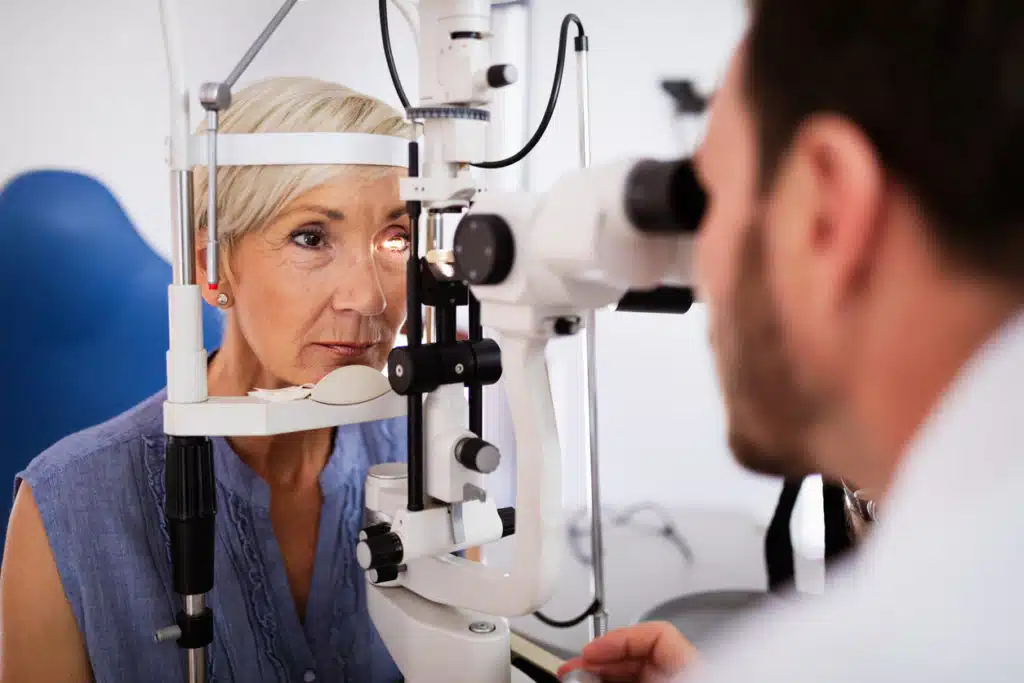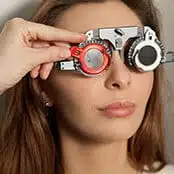
A recent survey found that only half of all Americans visit an eye doctor on a regular basis. There are two main types of eye doctors: ophthalmologists and optometrists. Whereas optometrists can diagnose and treat eye conditions and can prescribe glasses or contacts, ophthalmologists went to medical school and can perform eye surgery.
An ophthalmologist is therefore a medical specialist who practices comprehensive eye and vision care. Ophthalmologists use state-of-the-art diagnostic equipment to perform comprehensive eye exams, so they are able to accurately detect eye diseases or other abnormalities in their early stages – often before they present any symptoms. Early detection can lead to treatments that will help to prevent vision loss.
Thanks to their medical training, ophthalmologists can recognize other health problems during an eye examination that may not be directly related to the eye. These issues can include high blood pressure and some cancers. This is because the eye is part of the nervous system, so abnormalities can sometimes be detected in the fine blood vessels at the back of the eye even before they are recognized in other parts of the body.
When Should I Visit an Ophthalmologist?
It is recommended that adults visit an ophthalmologist as soon as possible if they experience any of the following symptoms:
Loss of Vision
Loss of vision or decreased vision in one or both eyes may require immediate treatment depending on the condition causing it. Vision loss may be due to an eye condition or an underlying health condition that can affect the visual processing centers in the brain.
Impaired vision does become more common with age. This can be the result of conditions such as diabetic retinopathy, glaucoma, cataracts, and age-related macular degeneration.
Changes in Vision
A change in your vision can occur due to a variety of reasons, and it may include visual symptoms such as:
- Sudden spots
- Shadows
- Flashes of light
- Double vision
- Blurred vision
- Jagged lines of light
- Wavy or watery vision
- Distortions (such as when observing faces)
- Blurriness in the central or peripheral vision
- Halos around light
- Changes in the field of vision (such as curtain-like loss of vision)
Vision changes can be a sign of a serious underlying medical condition such as diabetes, rheumatoid arthritis, or multiple sclerosis, or eye conditions such as macular degeneration, glaucoma, or cataracts.
Physical Changes to the Eye
Physical changes can include pain, redness, swelling, or discharge. It can also include irregularities such as crossed eyes and eyes that turn in, out, up, or down.
Changes in Color Perception
Sudden changes in seeing colors, or in the way that colors are perceived, can indicate an injury to the retina. It can also indicate a serious underlying issue such as glaucoma, macular degeneration, vascular disease, or metabolic disease.
Comprehensive Eye Care in Greater St. Louis, MO
If you are looking for comprehensive vision care in the Greater St. Louis area, look no further than the medical team at Advanced Sight Center. Our eye doctors are committed to providing you with quality eye care via advanced diagnostic tests and leading-edge medical and surgical treatments.
If you would like to find out more about our ophthalmology and optical services, call us at our Washington, Missouri location, or fill out our appointment request form online now. We look forward to seeing you!



